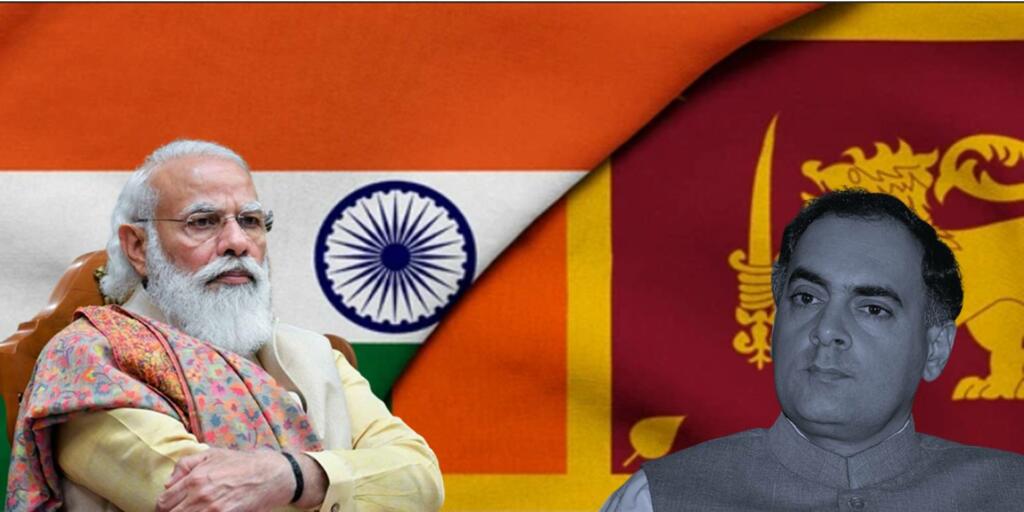What do great statesmen do? Well, they learn from the experiences and mistakes of their contemporaries and predecessors. And this is exactly what PM Modi is doing amidst the Sri Lanka crisis.
It takes no time for speculations and rumours to start flying around, especially when a crisis breaks out like the one that has engulfed Sri Lanka.
Suddenly, you see someone say that certain politicians and their families have fled to India. Then, you also hear someone say that India is going to land its boots on the ground in Sri Lanka. These remarks obviously generated fears of a repeat of the IPKF fiasco. However, the Modi government has now dispelled the fears of such an awkward situation.
India categorically denies “speculative reports” about sending troops to Sri Lanka
The Indian High Commission has specifically rejected speculative media reports about sending troops to Colombo while underlining India’s support for Sri Lankan democracy, stability and economic recovery.
The High Commission stated, “The High Commission would like to categorically deny speculative reports in sections of media and social media about #India sending her troops to Sri Lanka. These reports and such views are also not in keeping with the position of the Government of #India.”
It added, “The Spokesperson of Ministry of External Affairs of India clearly stated yesterday that India is fully supportive of Sri Lanka’s democracy, stability and economic recovery.”
Meanwhile, India’s Foreign Ministry spokesperson Arindam Bagchi too reiterated, “India will always be guided by the best interests of the people of Sri Lanka expressed through democratic processes.”
Learning from the mistakes of the Rajiv Gandhi-era
The Indian government is approaching the economic crisis in its Southern nation in a rather pragmatic and balanced way. It is making a conscious effort to avoid the IPKF blunder that was committed in the 1980s, when Colombo was facing the LTTE crisis.
At that time, the Rajiv Gandhi government decided to sign an accord with the Sri Lankan government and fight LTTE insurgents in Sri Lanka.
Col. R Hariharan, who played a pivotal role in the Indian Peace Keeping Force (IPKF) operations in Sri Lanka as a military intelligence officer, suggested that the Rajiv Gandhi government had arm-twisted then Sri Lanka President J R Jayawardene into signing an accord with India.
After India dropped food supplies in Jaffna in June 1987 under Operation Poomalai, Jayawardene realised that he had no other option left but to take India’s support.
Hariharan said, “This showed India would not hesitate to use force if Sri Lanka ignored Indian concerns. This action probably also kindled Sri Lankan Tamil expectations that India would re-enact another Bangladesh in Lanka and create an independent Tamil Eelam. But the accord not only underwrote India’s support for a united Lanka, but also defused the fight for an independent Eelam. Ultimately, Jayewardene got India to fight LTTE.”
Read more: Rajiv Gandhi’s legacy: Disastrous intervention in Sri Lanka
The policy of intervening militarily had dramatic consequences. On one hand, the Lankan Tamils felt somewhat alienated. And on the other hand, Lankans in general started apprehending excessive interventionism. The displeasure was expressed in a rather ugly way in 1987 when the then Prime Minister Rajiv Gandhi was attacked by a Sri Lankan sailor during the naval guard of honour at the Sri Lankan President’s house.
The entire episode, therefore, embittered centuries-old people-to-people ties between Sri Lanka and India.
PM Modi’s sensible approach to the Sri Lanka crisis
The lessons from the 1980s make it clear that any intervention in Sri Lanka is going to be counter-productive. India can and must help Colombo, but it cannot send boots on the ground and do things on Colombo’s behalf.
So, PM Modi is following a sensible stand on the Sri Lanka crisis. He has made it clear to Colombo that we are ready to help you bring your economy back on track, soothe the angry public and restore law and order. However, we are not going to go beyond that. This is bound to come as a matter of great assurance to the Lankan people and the troubled government in Colombo.
PM Modi is thus pursuing a hands-off approach on Sri Lanka, which will ensure that New Delhi consciously avoids the blunders made over three decades ago.
